Burt A. The Evolution of the British Empire and Commonwealth From the American Revolution
Подождите немного. Документ загружается.


Nationalism
in
the
Dominions,
Ireland,
and
India
725
imperial
authority.
This
"hybrid"
executive
was
admittedly
an
experi-
ment,
the
outcome
of
which
would
determine
the
further
transfer
of
authority
to
responsible
government.
Meanwhile
the
governor,
half
constitutional
sovereign
and
half
autocrat,
was
to
retain,
for
safety's
sake
in
an
emergency,
the
right
to
override
the
advice
of
his
responsible
ministers.
The
report
also dealt
with the
problem
of
communal
elector-
ates,
condemning
them
as
undemocratic
but
advising
their
retention
to
protect
the interests
of
the
Moslems.
When
the World
War
came
to
a
close,
the
British
government
was
preparing
a
bill
that
embodied
the recommendations
of
the
report
and
was
designed
to
open
a
new
and
more
liberal
era
in
the
history
of
India.
This
bill,
it is
interesting
to
note,
was
piloted
through
the
House
of
Lords
by
an
Indian,
Sinha,
who
had
been
raised
to
the
peerage
and
appointed
undersecretary
of state.
1
It
became
law
in
December
1919.
In
addition
to
introducing
dyarchy,
this
Government
of
India
Act
reformed
the Indian
legislatures,
central
and
provincial,
and
it
pro-
vided
that
after
ten
years
a
parliamentary
commission
should
review
the
working
of
the
new constitution
and
report
on
how
it could
then
be
improved.
India
took
a
great
step
forward
when
the
act
came
into
operation
in
1920,
as
we shall
see
in
a
later
chapter.
Looking
back,
one
may
observe
that the
whole
trend
of
British
policy
since
1858
had
been
toward
some
such
experiment
in
trusting
Indians
to
manage
their own
public
affairs,
and
that
the
rise of
Indian
nation-
alism
had
accelerated
the
pace
until
the
war
brought
on
a
race
between
the
British
tortoise
and
the Indian
hare,
or,
to be
more
exact,
between
reform
and
revolution.
The
1918
disclosure
of
a
widespread
terrorist
conspiracy
was
a
warning
to
the
British
ray;
and
the
spring
of
1919
saw
ominous
outbreaks,
one
of
which
was
suppressed
in a
manner
that
betrayed
British
fear,
inflamed
Indian
feeling,
and
attracted
world-
wide
attention.
In
the
Punjab
city
of
Amritsar
the
mob
brutally
murdered
several
Europeans,
burned
tie
banks
and
government
buildings
to
the
ground,
and
threatened
to
destroy
the
whole
European
community.
The civil
authorities
called
in
the
military,
and
General
Dyer
appeared
with
about
a
hundred
native
troops.
On
his
orders
they
fired
at
the
mass
target,
killing
nearly
four
hundred
and
wounding
some
twelve
hun-
i
After
its
passage
he
returned
to
India
as
governor
of one
of
the
provinces;
and in
1926,
his
health
having
failed,
he
went
hack
to
England
to serve
as
a memher
of the
judicial
committee
of
the
privy
council.
His
death
in
1928
was
a
great
loss
to the
British
and
the
Indians
alike.
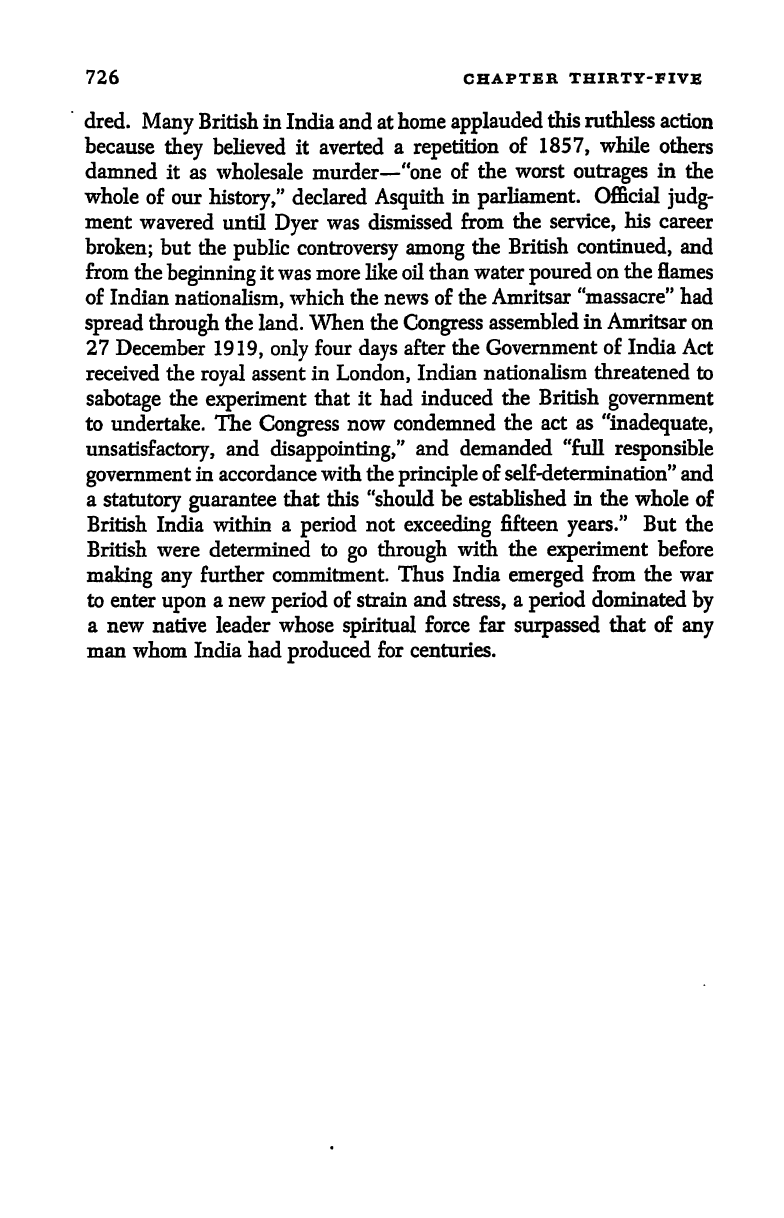
726
CHAPTER THIRTY-FIVE
dred.
Many
British in India and at
home
applauded
this ruthless
action
because
they
believed it averted
a
repetition
of
1857,
while
others
damned it
as
wholesale murder
"one
of
the
worst
outrages
in
the
whole
of
our
history,"
declared
Asquith
in
parliament.
Official
judg-
ment
wavered
until
Dyer
was dismissed
from
the
service,
his
career
broken;
but the
public
controversy
among
the
British
continued,
and
from the
beginning
it was more
like
oil than
water
poured
on the
flames
of
Indian
nationalism,
which
the news of
the Amritsar
"massacre"
had
spread
through
the land.
When
the
Congress
assembled
in
Amritsar
on
27
December
1919,
only
four
days
after the Government
of
India
Act
received the
royal
assent
in
London,
Indian
nationalism
threatened
to
sabotage
the
experiment
that
it
had
induced
the
British
government
to
undertake.
The
Congress
now
condemned
the
act as
"inadequate,
unsatisfactory,
and
disappointing/'
and
demanded
"full
responsible
government
in
accordance
with the
principle
of
self-determination"
and
a
statutory
guarantee
that
this "should be
established
in
the whole
of
British India within
a
period
not
exceeding
fifteen
years."
But
the
British were determined
to
go through
with
the
experiment
before
making
any
further commitment.
Thus
India
emerged
from
the
war
to
enter
upon
a
new
period
of
strain and
stress,
a
period
dominated
by
a new native
leader
whose
spiritual
force far
surpassed
that of
any
man whom
India had
produced
for centuries.
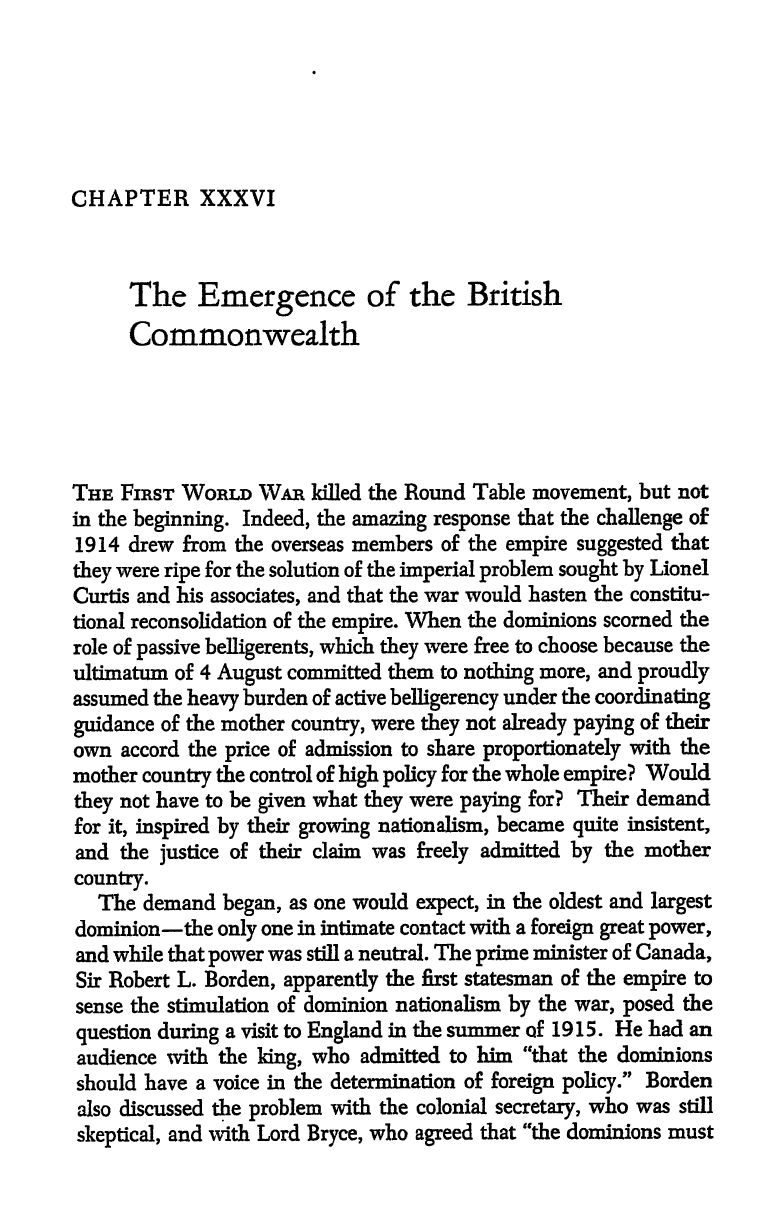
CHAPTER
XXXVI
The
Emergence
of the
British
Commonwealth
THE
FIRST WORLD WAR killed
the Round
Table
movement,
but
not
in
the
beginning.
Indeed,
the
amazing
response
that
the
challenge
of
1914 drew
from the
overseas
members
of the
empire
suggested
that
they
were
ripe
for
the solution
of the
imperial
problem
sought
by
Lionel
Curtis
and
his
associates,
and that the
war would
hasten
the
constitu-
tional
reconsolidation
of the
empire.
When
the dominions
scorned
the
role of
passive belligerents,
which
they
were
free
to
choose
because
the
ultimatum of
4
August
committed
them
to
nothing
more,
and
proudly
assumed
the
heavy
burden
of active
belligerency
under
the
coordinating
guidance
of
the
mother
country,
were
they
not
already
paying
of
their
own
accord
the
price
of
admission to
share
proportionately
with
the
mother
country
the control of
high policy
for
the whole
empire?
Would
they
not
have to
be
given
what
they
were
paying
for?
Their
demand
for
it,
inspired
by
their
growing
nationalism,
became
quite
insistent,
and
the
justice
of
their
claim
was
freely
admitted
by
the
mother
country.
The
demand
began,
as one
would
expect,
in the oldest
and
largest
dominion
the
only
one
in
intimate
contact
with a
foreign great
power,
and
while
that
power
was still a neutral.
The
prime
minister of
Canada,
Sir Robert
L.
Borden,
apparently
the first statesman
of the
empire
to
sense
the
stimulation
of dominion
nationalism
by
the
war,
posed
the
question
during
a
visit
to
England
in the summer
of
1915. He had
an
audience
with
the
king,
who
admitted
to
him
"that the dominions
should
have
a
voice
in the
determination
of
foreign
policy."
Borden
also
discussed
the
problem
with
the
colonial
secretary,
who
was still
skeptical,
and
with
Lord
Bryce,
who
agreed
that
"the dominions
must
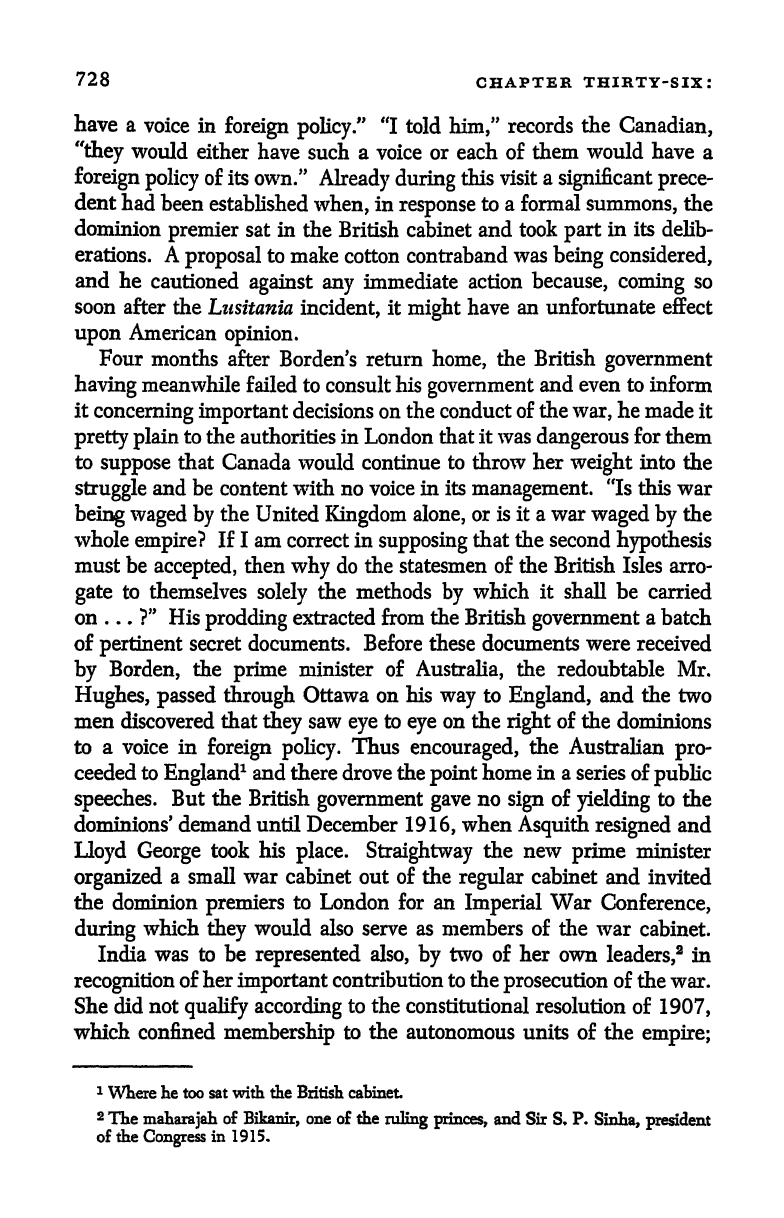
728
CHAPTER
THIRTY-SIX:
have a
voice in
foreign
policy."
"I told
him,"
records
the
Canadian,
"they
would
either
have such
a
voice or each of
them
would have
a
foreign
policy
of its own."
Already
during
this
visit a
significant prece-
dent
had
been
established
when,
in
response
to
a
formal
summons,
the
dominion
premier
sat
in the
British cabinet
and
took
part
in
its
delib-
erations.
A
proposal
to make
cotton
contraband
was
being
considered,
and
he
cautioned
against any
immediate
action
because,
coining
so
soon
after the
Lusitania
incident,
it
might
have
an unfortunate
effect
upon
American
opinion.
Four
months
after Borden's
return
home,
the British
government
having
meanwhile
failed
to consult his
government
and even to
inform
it
concerning important
decisions on
the
conduct
of the
war,
he
made
it
pretty
plain
to the
authorities
in
London
that
it
was
dangerous
for
them
to
suppose
that
Canada
would
continue
to throw her
weight
into
the
struggle
and be content
with no voice
in
its
management.
"Is
this
war
being
waged
by
the
United
Kingdom
alone,
or
is it a war
waged by
the
whole
empire?
If
I am
correct
in
supposing
that the
second
hypothesis
must
be
accepted,
then
why
do
the statesmen of the
British
Isles
arro-
gate
to themselves
solely
the methods
by
which
it
shall be
carried
on
...
?"
His
prodding
extracted from
the
British
government
a
batch
of
pertinent
secret documents. Before
these
documents
were
received
by
Borden,
the
prime
minister of
Australia,
the
redoubtable Mr.
Hughes,
passed
through
Ottawa on his
way
to
England,
and
the
two
men
discovered
that
they
saw
eye
to
eye
on the
right
of the
dominions
to
a
voice
in
foreign
policy.
Thus
encouraged,
the
Australian
pro-
ceeded to
England
1
and there drove the
point
home
in a series
of
public
speeches.
But the British
government
gave
no
sign
of
yielding
to
the
dominions'
demand until December
1916,
when
Asquith
resigned
and
Lloyd
George
took
his
place.
Straightway
the new
prime
minister
organized
a
small
war
cabinet out
of the
regular
cabinet
and
invited
the
dominion
premiers
to
London
for
an
Imperial
War
Conference,
during
which
they
would also
serve as members of the
war
cabinet.
India
was
to be
represented
also,
by
two
of
her
own
leaders,
2
in
recognition
of
her
important
contribution
to
the
prosecution
of the war.
She
did
not
qualify
according
to
the
constitutional
resolution
of
1907,
which
confined
membership
to
the
autonomous
units
of the
empire;
1
Where
he too sat
with the
British
cabinet
2
The
maharajah
of
Bikarrir,
one of the
ruling
princes,
and
Sir
S,
P.
Sinha,
president
of
the
Congress
in 1915.
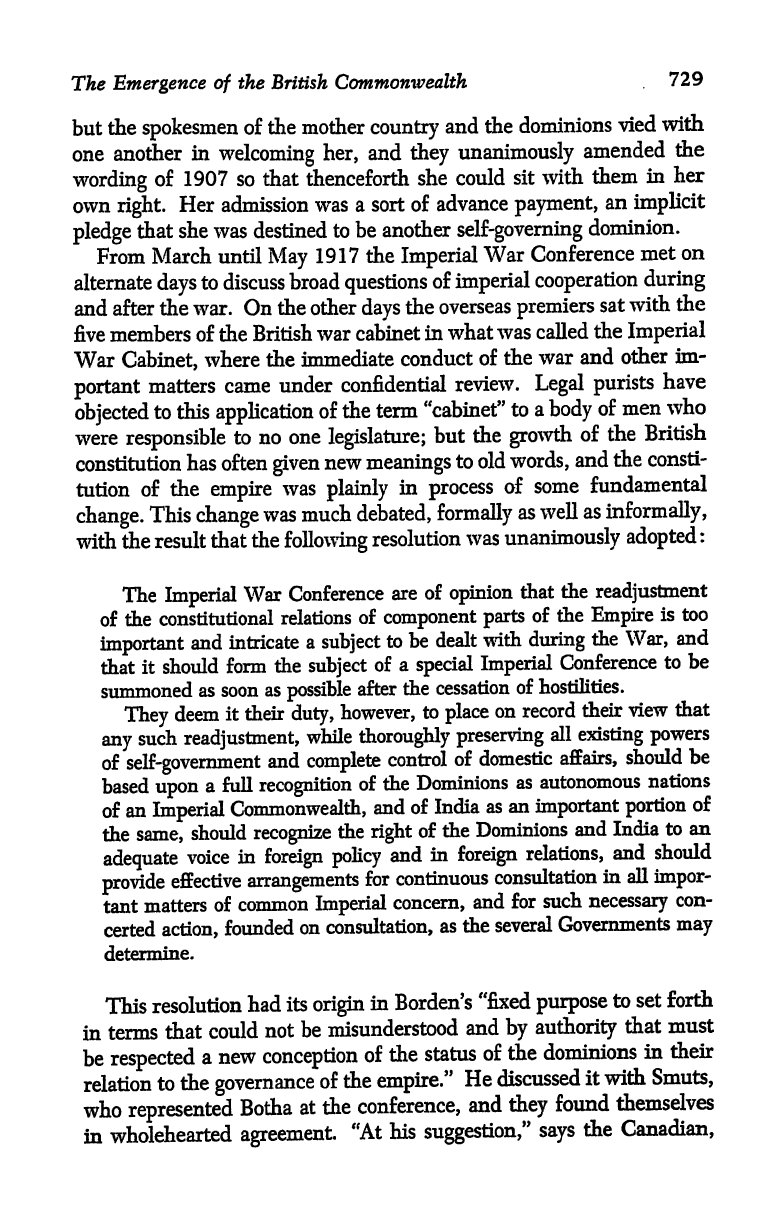
The
Emergence
of
the
British Commonwealth
729
but
the
spokesmen
of
the
mother
country
and
the
dominions
vied
with
one
another
in
welcoming
her,
and
they
unanimously
amended
the
wording
of
1907
so
that
thenceforth
she
could
sit
with
them
in
her
own
right.
Her
admission
was a
sort of
advance
payment,
an
implicit
pledge
that
she was destined
to
be another
self-governing
dominion.
From
March
until
May
1917
the
Imperial
War Conference
met
on
alternate
days
to discuss
broad
questions
of
imperial
cooperation
during
and
after
the war.
On
the other
days
the
overseas
premiers
sat
with
the
five members
of
the
British
war cabinet
in
what
was
called
the
Imperial
War
Cabinet,
where
the
immediate
conduct
of
the
war
and
other
im-
portant
matters
came
under
confidential
review.
Legal
purists
have
objected
to this
application
of
the
term
"cabinet"
to
a
body
of
men
who
were
responsible
to
no one
legislature;
but
the
growth
of
the
British
constitution
has
often
given
new
meanings
to
old
words,
and
the
consti-
tution
of
the
empire
was
plainly
in
process
of
some
fundamental
change.
This
change
was much
debated,
formally
as
well
as
informally,
with
the
result
that
the
following
resolution
was
unanimously
adopted:
The
Imperial
War Conference
are
of
opinion
that
the
readjustment
of
the
constitutional
relations
of
component
parts
of
the
Empire
is too
important
and
intricate
a
subject
to
be
dealt
with
during
the
War,
and
that
it should
form
the
subject
of
a
special
Imperial
Conference
to
be
summoned
as soon
as
possible
after
the
cessation
of
hostilities.
They
deem
it
their
duty,
however,
to
place
on record
their
view
that
any
such
readjustment,
while
thoroughly
preserving
all
existing
powers
of
self-government
and
complete
control
of
domestic
affairs,
should
be
based
upon
a
full
recognition
of
the
Dominions
as
autonomous
nations
of
an
Imperial
Commonwealth,
and
of
India
as
an
important
portion
of
the
same,
should
recognize
the
right
of
the
Dominions
and
India to
an
adequate
voice
in
foreign
policy
and
in
foreign
relations,
and
should
provide
effective
arrangements
for
continuous
consultation
in all
impor-
tant
matters
of
common
Imperial
concern,
and
for
such
necessary
con-
certed
action,
founded
on
consultation,
as
the
several
Governments
may
determine.
This
resolution
had
its
origin
in Borden's
"fixed
purpose
to
set forth
in
terms
that
could
not
be
misunderstood
and
by
authority
that
must
be
respected
a
new
conception
of
the
status
of
the
dominions
in
their
relation
to
the
governance
of
the
empire."
He discussed
it
with
Smuts,
who
represented
Botha
at the
conference,
and
they
found
themselves
in
wholehearted
agreement.
"At
his
suggestion,"
says
the
Canadian,
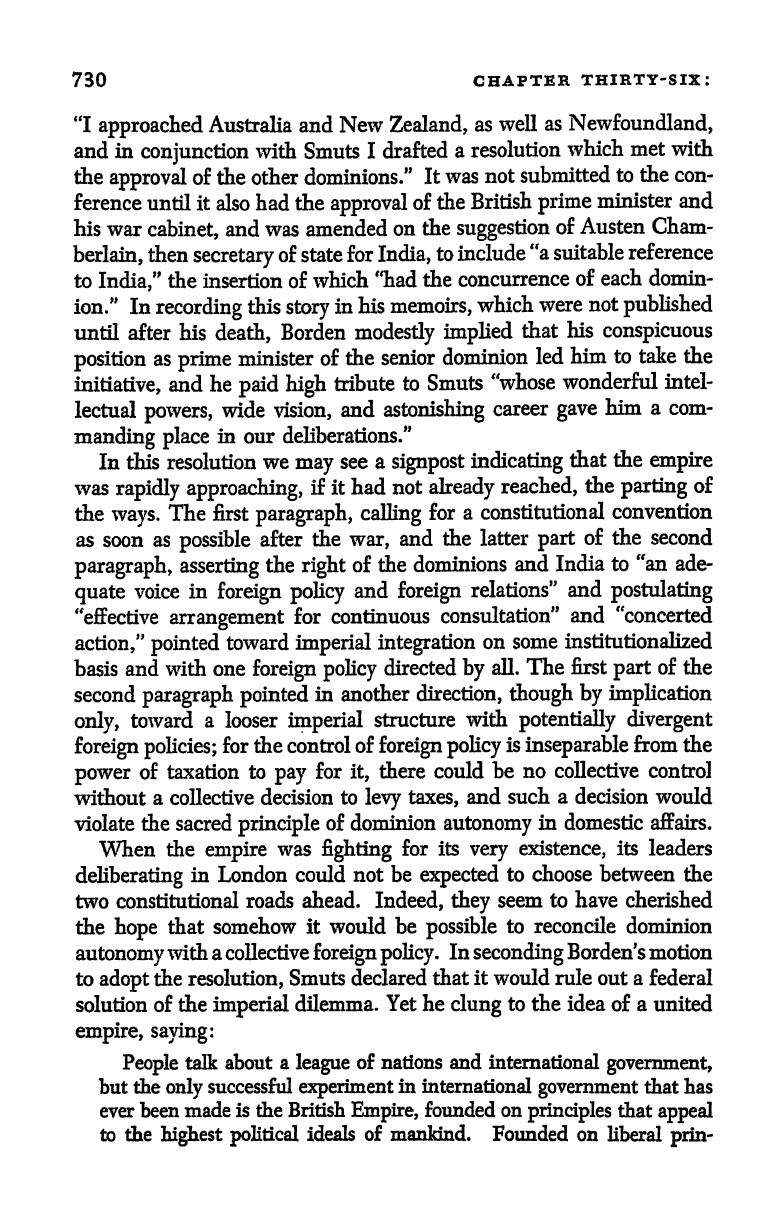
730
CHAPTER
THIRTY-SIX:
"I
approached
Australia and New
Zealand,
as
well
as
Newfoundland,
and
in
conjunction
with
Smuts
I
drafted
a
resolution
which
met
with
the
approval
of the other
dominions."
It
was
not
submitted
to
the
con-
ference until
it also had
the
approval
of
the
British
prime
minister
and
his war
cabinet,
and was
amended
on
the
suggestion
of
Austen Cham-
berlain,
then
secretary
of state
for
India,
to
include
"a
suitable
reference
to
India,"
the insertion of
which
"had
the concurrence
of each domin-
ion." In
recording
this
story
in
his
memoirs,
which
were
not
published
until after
his
death,
Borden
modestly
implied
that his
conspicuous
position
as
prime
minister
of
the senior
dominion
led
him
to take the
initiative,
and he
paid
high
tribute
to
Smuts
"whose
wonderful
intel-
lectual
powers,
wide
vision,
and
astonishing
career
gave
him
a
com-
manding
place
in our deliberations."
In
this resolution
we
may
see
a
signpost
indicating
that
the
empire
was
rapidly
approaching,
if it had
not
already
reached,
the
parting
of
the
ways.
The first
paragraph,
calling
for
a
constitutional
convention
as
soon
as
possible
after
the
war,
and the latter
part
of the
second
paragraph,
asserting
the
right
of
the dominions
and India
to
"an
ade-
quate
voice
in
foreign
policy
and
foreign
relations"
and
postulating
"effective
arrangement
for continuous
consultation"
and "concerted
action,"
pointed
toward
imperial
integration
on some
institutionalized
basis
and with one
foreign
policy
directed
by
all.
The
first
part
of the
second
paragraph
pointed
in another
direction,
though
by implication
only,
toward
a
looser
imperial
structure
with
potentially divergent
foreign
policies;
for
the
control
of
foreign policy
is
inseparable
from the
power
of taxation
to
pay
for
it,
there could
be
no collective control
without
a
collective
decision
to
levy
taxes,
and
such
a
decision would
violate
the sacred
principle
of dominion
autonomy
in domestic affairs.
When
the
empire
was
fighting
for its
very
existence,
its leaders
deliberating
in London
could not be
expected
to choose between the
two constitutional
roads ahead.
Indeed,
they
seem to have cherished
the
hope
that somehow
it would be
possible
to
reconcile
dominion
autonomy
with a collective
foreign policy.
In
seconding
Borden's
motion
to
adopt
the
resolution,
Smuts declared
that
it
would
rule
out
a
federal
solution
of the
imperial
dilemma.
Yet he
clung
to the idea
of a united
empire, saying:
People
talk about
a
league
of nations
and
international
government,
but
the
only
successful
experiment
in
international
government
that
has
ever
been
made
is the British
Empire,
founded on
principles
that
appeal
to
the
highest
political
ideals
of
mankind.
Founded on
liberal
prin-
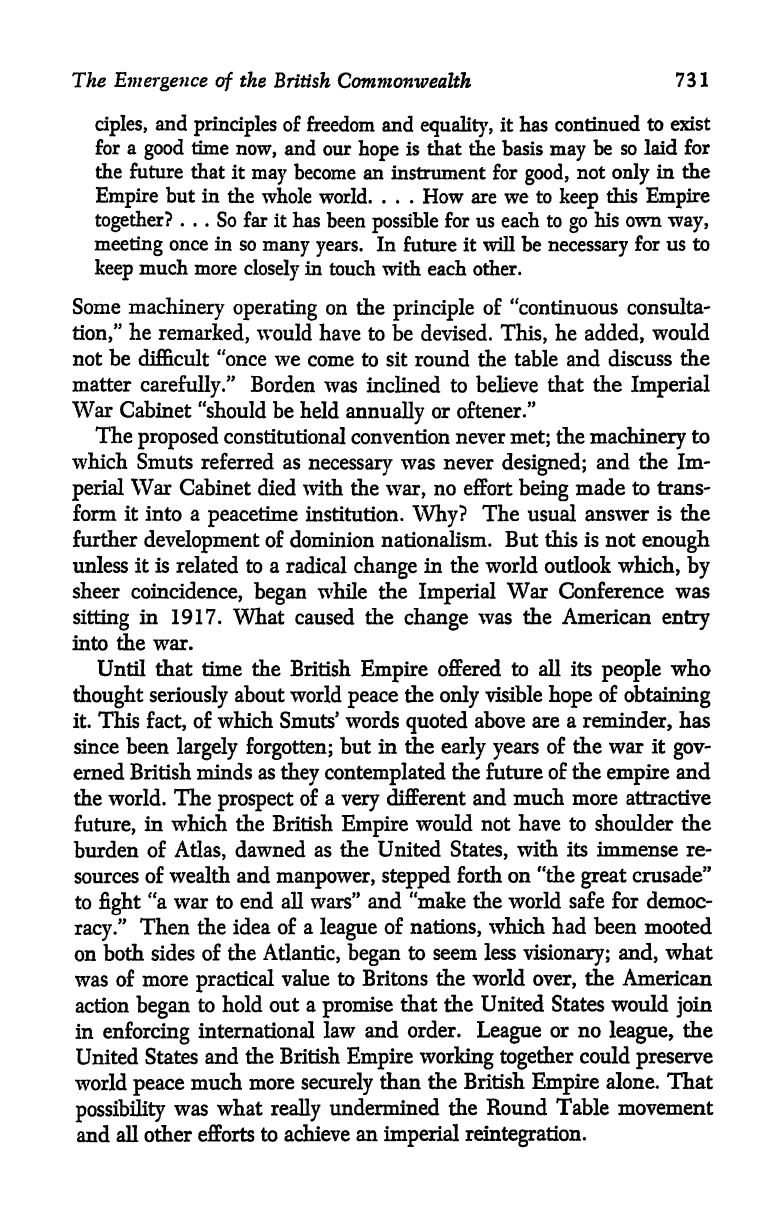
The
Emergence of
the
British
Commonwealth
731
ciples,
and
principles
of
freedom and
equality,
it has
continued
to
exist
for
a
good
time
now,
and
our
hope
is
that the
basis
may
be so
laid
for
the future
that
it
may
become an
instrument
for
good,
not
only
in
the
Empire
but
in
the
whole
world. . .
.
How
are
we
to
keep
this
Empire
together?
...
So far
it has
been
possible
for
us
each
to
go
his own
way,
meeting
once in
so
many
years.
In
future
it will
be
necessary
for us to
keep
much
more
closely
in
touch with
each
other.
Some
machinery
operating
on the
principle
of
"continuous
consulta-
tion,"
he
remarked,
would
have to
be devised.
This,
he
added,
would
not
be
difficult
"once
we
come
to
sit
round the table
and discuss
the
matter
carefully/'
Borden
was inclined to
believe
that the
Imperial
War
Cabinet
"should
be
held
annually
or
oftener."
The
proposed
constitutional convention
never
met;
the
machinery
to
which Smuts
referred
as
necessary
was
never
designed;
and
the
Im-
perial
War
Cabinet
died with
the
war,
no
effort
being
made to
trans-
form it
into
a
peacetime
institution.
Why?
The usual answer
is the
further
development
of dominion nationalism.
But this
is
not
enough
unless
it
is
related to
a
radical
change
in
the world
outlook
which,
by
sheer
coincidence,
began
while
the
Imperial
War
Conference
was
sitting
in
1917.
What caused
the
change
was the
American
entry
into
the war.
Until that time the
British
Empire
offered
to all its
people
who
thought
seriously
about
world
peace
the
only
visible
hope
of
obtaining
it. This
fact,
of
which Smuts' words
quoted
above are a
reminder,
has
since
been
largely
forgotten;
but
in
tie
early years
of
the war it
gov-
erned
British
minds
as
they
contemplated
the future of the
empire
and
the world. The
prospect
of
a
very
different and
much more attractive
future,
in which the British
Empire
would not
have
to shoulder
the
burden
of
Atlas,
dawned
as
the United
States,
with its
immense
re-
sources
of wealth and
manpower,
stepped
forth
on
"the
great
crusade"
to
fight
"a
war
to
end
all wars" and "make
the
world
safe for democ-
racy."
Then the idea
of
a
league
of
nations,
which had been
mooted
on
both sides
of
the
Atlantic,
began
to seem less
visionary;
and,
what
was of
more
practical
value to Britons
the world
over,
the American
action
began
to
hold out a
promise
that
the
United States
would
join
in
enforcing
international
law
and order.
League
or no
league,
the
United
States
and the
British
Empire
working
together
could
preserve
world
peace
much
more
securely
than the British
Empire
alone. That
possibility
was
what
really
undermined
the
Round Table movement
and all other
efforts to
achieve
an
imperial
reintegration.
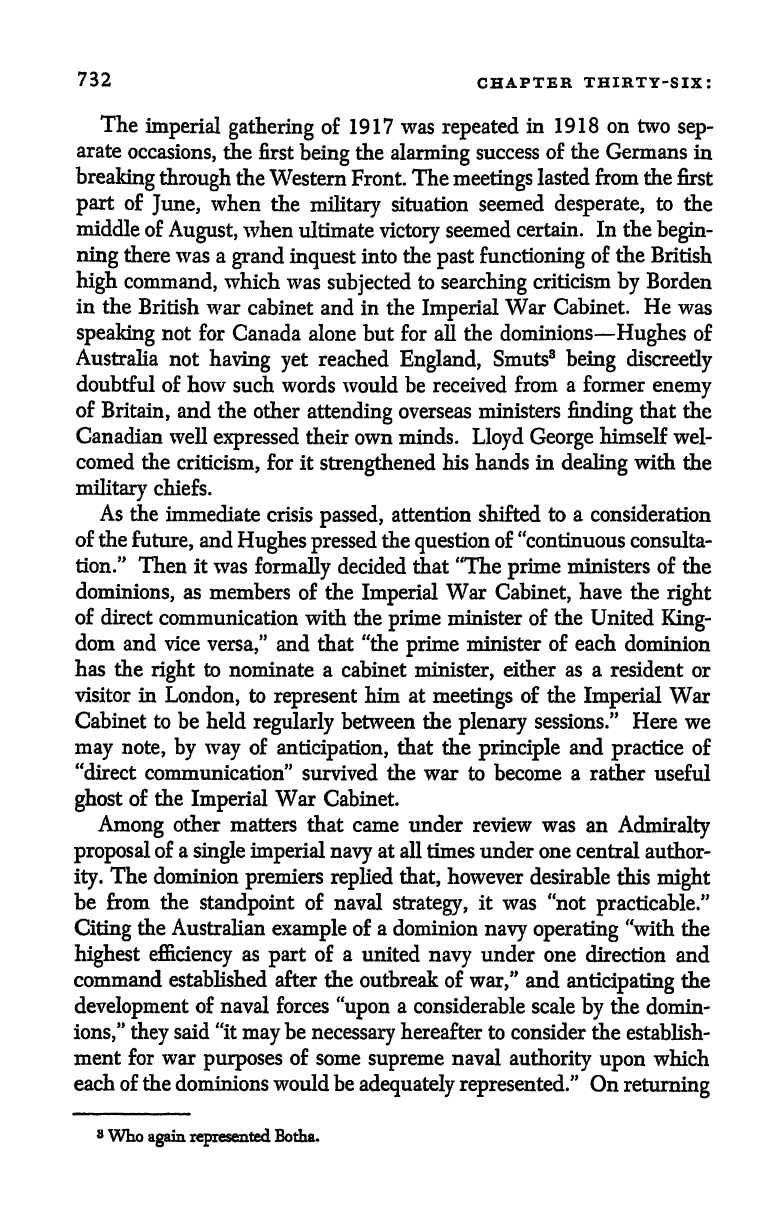
732
CHAPTER THIRTY-SIX:
The
imperial
gathering
of
1917 was
repeated
in 1918 on two
sep-
arate
occasions,
tie
first
being
the
alarming
success
of the Germans
in
breaking
through
the
Western Front.
The
meetings
lasted
from
the
first
part
of
June,
when
the
military
situation
seemed
desperate,
to
the
middle
of
August,
when
ultimate
victory
seemed
certain. In the
begin-
ning
there was
a
grand inquest
into
the
past
functioning
of the
British
high
command,
which
was
subjected
to
searching
criticism
by
Borden
in
the
British
war
cabinet and in the
Imperial
War Cabinet.
He
was
speaking
not for
Canada alone
but
for all
the
dominions
Hughes
of
Australia
not
having yet
reached
England,
Smuts
3
being
discreetly
doubtful
of
how
such words
would
be received
from
a
former
enemy
of
Britain,
and
the
other
attending
overseas
ministers
finding
that
the
Canadian
well
expressed
their
own
minds.
Lloyd
George
himself
wel-
comed
the
criticism,
for
it
strengthened
his hands
in
dealing
with
the
military
chiefs.
As
the
immediate
crisis
passed,
attention
shifted to
a
consideration
of
the
future,
and
Hughes
pressed
the
question
of "continuous consulta-
tion."
Then it
was
formally
decided
that "The
prime
ministers of
the
dominions,
as
members
of
the
Imperial
War
Cabinet,
have the
right
of
direct
communication with
the
prime
minister of
the
United
King-
dom
and vice
versa,"
and
that "the
prime
minister of each
dominion
has
the
right
to
nominate
a
cabinet
minister,
either as a
resident or
visitor
in
London,
to
represent
him
at
meetings
of
the
Imperial
War
Cabinet to
be held
regularly
between the
plenary
sessions."
Here we
may
note,
by way
of
anticipation,
that the
principle
and
practice
of
"direct
communication"
survived
the
war
to become
a
rather
useful
ghost
of
the
Imperial
War
Cabinet.
Among
other
matters
that
came
under
review was
an
Admiralty
proposal
of a
single
imperial
navy
at
all times under one central
author-
ity.
The dominion
premiers
replied
that,
however
desirable
this
might
be
from the
standpoint
of
naval
strategy,
it
was "not
practicable."
Citing
the Australian
example
of
a
dominion
navy
operating
"with
the
highest
efficiency
as
part
of
a
united
navy
under
one
direction
and
command
established after
the outbreak
of
war,"
and
anticipating
the
development
of naval forces
"upon
a
considerable
scale
by
the
domin-
ions,"
they
said "it
may
be
necessary
hereafter
to consider
the
establish-
ment
for
war
purposes
of
some
supreme
naval
authority
upon
which
each
of
the
dominions would be
adequately
represented."
On
returning
3
Who
again
represented
Botha.
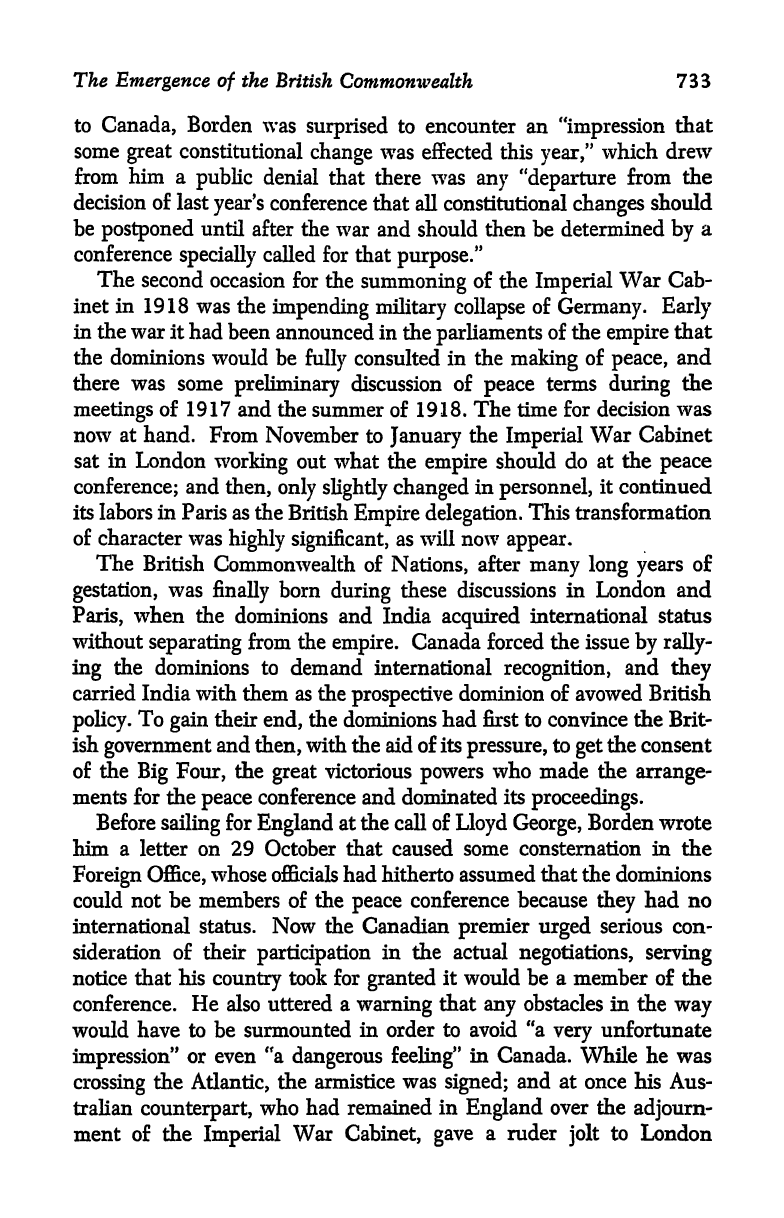
The
Emergence of
the
British
Commonwealth
733
to
Canada,
Borden
was
surprised
to
encounter an
"impression
that
some
great
constitutional
change
was effected
this
year,"
which
drew
from
him
a
public
denial
that there
was
any
"departure
from
the
decision
of
last
year's
conference
that all constitutional
changes
should
be
postponed
until
after the
war
and
should
then be determined
by
a
conference
specially
called for
that
purpose."
The
second
occasion for
the
summoning
of
the
Imperial
War Cab-
inet
in
1918 was
the
impending
military
collapse
of
Germany.
Early
in
the war
it
had been
announced
in
the
parliaments
of
the
empire
that
the
dominions
would
be
fully
consulted
in the
making
of
peace,
and
there was
some
preliminary
discussion
of
peace
terms
during
the
meetings
of 1917
and
the
summer of 1918. The
time for decision
was
now
at
hand.
From
November
to
January
the
Imperial
War
Cabinet
sat
in
London
working
out what
the
empire
should
do
at the
peace
conference;
and
then,
only
slightly
changed
in
personnel,
it
continued
its
labors in Paris as
the
British
Empire
delegation.
This transformation
of character
was
highly significant,
as will now
appear.
The
British
Commonwealth
of
Nations,
after
many
long
years
o
gestation,
was
finally
born
during
these discussions
in
London
and
Paris,
when the
dominions
and India
acquired
international
status
without
separating
from
the
empire.
Canada
forced the
issue
by rally-
ing
the
dominions
to
demand international
recognition,
and
they
carried
India
with
them as the
prospective
dominion
of avowed
British
policy.
To
gain
their
end,
the
dominions had
first
to convince
the Brit-
ish
government
and
then,
with the
aid of its
pressure,
to
get
the
consent
of
the
Big
Four,
the
great
victorious
powers
who
made
the
arrange-
ments for
the
peace
conference
and dominated
its
proceedings.
Before
sailing
for
England
at
the call of
Lloyd
George,
Borden
wrote
him
a
letter
on 29
October
that caused
some consternation in the
Foreign
Office,
whose officials had hitherto
assumed that the
dominions
could not be members of the
peace
conference because
they
had
no
international
status. Now the
Canadian
premier
urged
serious
con-
sideration
of their
participation
in the
actual
negotiations,
serving
notice that
his
country
took
for
granted
it would
be
a
member
of the
conference.
He
also uttered
a
warning
that
any
obstacles
in
the
way
would have
to
be
surmounted
in order to avoid
"a
very
unfortunate
impression"
or
even "a
dangerous
feeling"
in
Canada.
While
he
was
crossing
the
Atlantic,
the
armistice
was
signed;
and at
once his
Aus-
tralian
counterpart,
who had
remained
in
England
over
the
adjourn-
ment
of the
Imperial
War
Cabinet,
gave
a
ruder
jolt
to
London
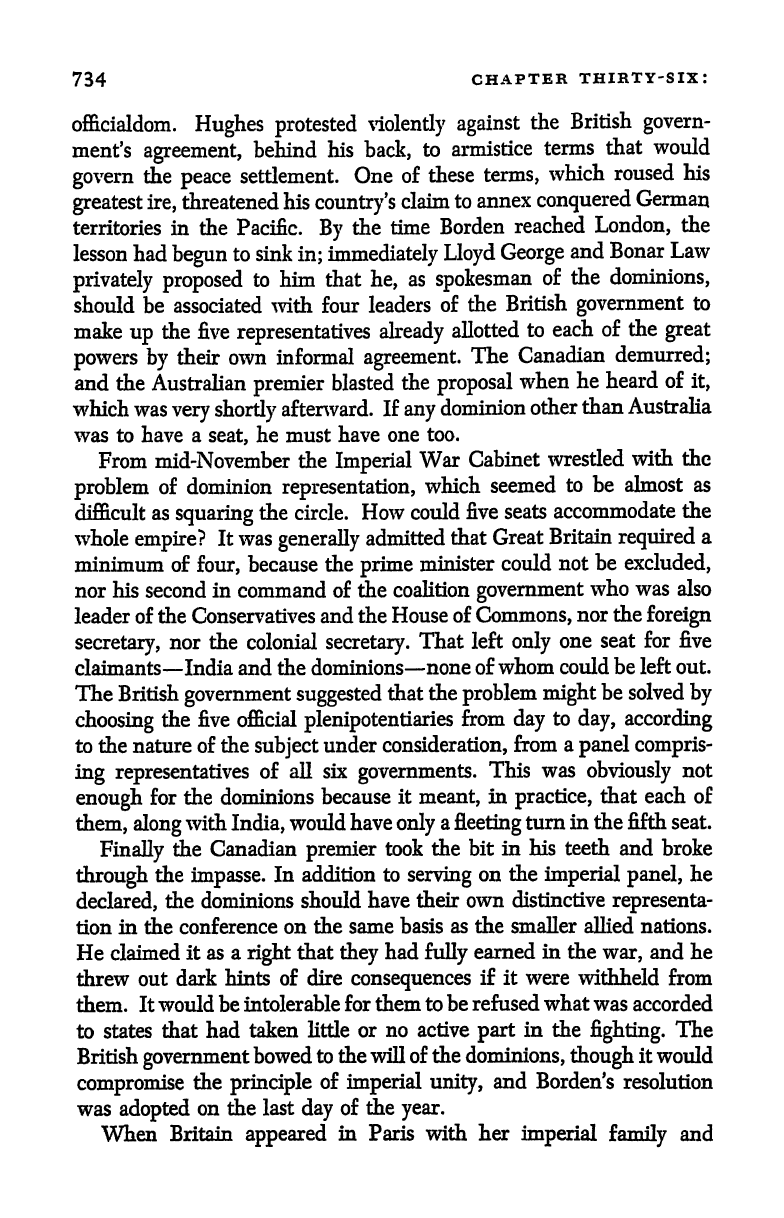
734
CHAPTER
THIRTY-SIX:
officialdom.
Hughes protested
violently
against
the
British
govern-
ment's
agreement,
behind his
back,
to
armistice
terms
that
would
govern
the
peace
settlement. One
of
these
terms,
which
roused
his
greatest
ire,
threatened his
country's
claim
to
annex
conquered
German
territories
in the Pacific.
By
the
time
Borden
reached
London,
the
lesson
had
begun
to
sink
in;
immediately
Lloyd
George
and
Bonar Law
privately proposed
to him
that
he,
as
spokesman
of
the
dominions,
should be associated with
four
leaders
of
the
British
government
to
make
up
the
five
representatives
already
allotted
to
each
of
the
great
powers by
their own informal
agreement.
The
Canadian
demurred;
and the Australian
premier
blasted
the
proposal
when
he heard
of
it,
which was
very
shortly
afterward.
If
any
dominion
other
than
Australia
was
to
have a
seat,
he must
have
one
too.
From
mid-November the
Imperial
War
Cabinet
wrestled
with the
problem
of dominion
representation,
which
seemed
to be almost as
difficult
as
squaring
the
circle.
How
could
five seats
accommodate
the
whole
empire?
It
was
generally
admitted
that Great
Britain
required
a
minimum
of
four,
because
the
prime
minister
could not
be
excluded,
nor his
second
in
command of
the
coalition
government
who was
also
leader of
the
Conservatives
and the House
of
Commons,
nor the
foreign
secretary,
nor
the
colonial
secretary.
That left
only
one
seat
for
five
claimants India and
the dominions
none
of
whom could be left out.
The
British
government
suggested
that the
problem
might
be solved
by
choosing
the
five
official
plenipotentiaries
from
day
to
day,
according
to
the
nature of
the
subject
under
consideration,
from
a
panel
compris-
ing
representatives
of
all
six
governments.
This
was
obviously
not
enough
for
the dominions
because
it
meant,
in
practice,
that
each of
them,
along
with
India,
would
have
only
a
fleeting
turn
in the fifth seat.
Finally
the Canadian
premier
took the bit
in his teeth
and broke
through
the
impasse.
In
addition to
serving
on the
imperial
panel,
he
declared,
the dominions
should
have
their own
distinctive
representa-
tion
in the conference
on
the same basis
as the
smaller allied nations.
He claimed
it
as a
right
that
they
had
fully
earned
in the
war,
and
he
threw out
dark
hints of dire
consequences
if
it were
withheld
from
them. It
would be intolerable
for
them
to be
refused
what
was
accorded
to states
that had
taken
little or
no active
part
in
the
fighting.
The
British
government
bowed to
the will of the
dominions,
though
it
would
compromise
the
principle
of
imperial
unity,
and
Borden's resolution
was
adopted
on
the last
day
of
the
year.
When
Britain
appeared
in
Paris
with her
imperial
family
and
